- Home
- Neal Shusterman
UnBound Page 24
UnBound Read online
Page 24
“It’s a pleasure to meet you, Keaton Miguel Shelton,” says Camus. He holds out his hand, and Keaton shakes it—getting the handshake right the first time.
He returns to the dormitory feeling he’s accomplished something. And later that night, he receives a present in a box labeled for Keaton M. Shelton. It’s a prewar plastic toy. A Rubik’s Cube courtesy of Camus Comprix.
4 • Cam
The rewinds all receive names. There are far more names on the list than there are rewinds, so no one leaves without a choice. None leave feeling slighted.
Cam works to remember each of their names and faces. At first it’s hard to tell them apart; they all have shaved heads that have barely begun to grow in, and the asymmetry makes it even harder. The human mind is designed to recognize faces, not mosaics, and the hodgepodge nature of their features leaves little for the mind to grasp. It isn’t until Cam starts focusing on the scars that he begins to tell them apart. Every rewind has their own individual scar pattern. Soon he knows many of them by name—but not all of them. There are those who keep their distance, lurking in shadows whenever he’s around. Cam chooses to let that go. If he gives them space, and enough time, they’ll come out of their shells when they’re ready.
Una has found her harmony. She now wields a camera, documenting the colony’s progress.
“I have to choose my images wisely,” she tells Cam. “I have to show the rewinds as both triumphant and tragic. People have to see them as human, but must always remember what a bad idea it was to create them.”
Cam knows what she says is true, but it still hits him in a very personal place. “Like it was a bad idea to create me?”
“Oh please,” says Una with a dismissive wave. “Why must it always be about you?” But then she considers it a little more seriously. “The world is full of bad ideas that turn into wonderful things,” she says, and gives him a peck on the cheek.
5 • Keaton
Spirits are high in the rewind ward after naming day. There are fewer fights, more laughter. There are hints at real communication between the rewinds. Keaton is happy to watch, enjoying the change. The sense of a future is so much more compelling than an endless present.
He watches two kids attempt a game of checkers. They get a whole five minutes into the game before one of them flips the board in anger, and guards have to pull them apart. Five minutes! That’s a great start. Tomorrow it might be ten!
Then someone raps Keaton hard on the shoulder. He turns to see the rewind with hollow, mismatched eyes.
“Dirk,” he says, and raps Keaton on the arm again. “Dirk Mullen. Dirk Zachary Mullen.”
He keeps hitting Keaton until Keaton says, “Dirk. Yeah. Got it.”
“You—me,” Dirk says. “Part—part.” And he holds up his right hand. It’s the exact same shade of brown as Keaton’s left hand—and Keaton realizes that those hands came from the same Unwind. They’re a matching pair.
Suddenly Dirk grabs Keaton’s umber hand with his. It feels strange yet familiar clasping those hands together.
“Brother-self,” says Dirk. “Hand of my hand.”
Dirk doesn’t let go. Finally Keaton repeats, “Hand of my hand,” and Dirk, satisfied, releases his grip.
“You—me, take no prisoners,” Dirk says, then laughs. “Police have no leads.”
The guards begin herding the rewinds into the cafeteria for dinner, and Keaton slips away from Dirk Zachary Mullen, finding a crowded table to make sure that Dirk can’t join him if he wanted to.
Keaton eats, but he has no appetite because all he can think about is Dirk and those eyes. Most of the rewinds’ eyes are mismatched—but it’s more than that when it comes to Dirk. There was something Keaton saw in Dirk’s eyes, and it frightens him. Because the something he saw . . . was nothing.
6 • Cam
Cam decides to allow the rewinds outside.
Not outside the compound’s fence, of course, just outside of the rewind ward. Some who express an interest are given jobs, to add to their self-respect.
“Menial labor,” Dr. Pettigrew notes, “is probably all they can hope for.”
Cam won’t dignify that with a response. For their leisure time Cam gives a group of them basketballs, and they are allowed to play on the court by the main mansion. Unwinds, Cam recalls, were monitored in harvest camps so that prices could be put on their muscle groups. Cam makes sure there are no video cameras watching them now as they play.
Cam still runs the many paths of the Molokai compound. He encourages the rewinds to run with him, leading by example. “Sound body will bring a sound mind,” he tells them. “Teach your muscles to work together, and the rest of you will follow.”
Some run with him; others walk the route more slowly, unable to coax their reformed selves into the complex concert of a jog. Some don’t come at all. Cam won’t force them. Everyone has a different timetable.
“Is it really wise to give them this much freedom?” Dr. Pettigrew asks, clearly thinking Cam a fool for not keeping them locked up in the ward. If it were up to the good doctor, the rewinds would be turned into institutional vegetables, unable to function outside of the rewind ward.
“They’ll all be free eventually,” Cam tells him. “They should learn how it feels now.” He knows that the doctor is sending reports back to their superiors. Cam can only hope that they’ll take Pettigrew’s reports with a grain of salt—and that his own progress with the rewinds will be proof of Cam’s approach.
But what if they want what the doctor wants? What if they don’t care about rehabilitation—what if they simply wish to brush all these rewinds under a rug and make the world forget about them?
He must believe that if he can prove their value—their humanity—his superiors will see what a mistake it is to keep them locked away.
• • •
After today’s run Cam finds Una in the mansion’s grand living room. It’s a place of many memories. It holds the mirror where he first saw himself. The large tabletop computer interface where Roberta coaxed his reintegration through pictures and torturous mental exercises.
Today Una also has pictures open on the table face. Her photos. She scrutinizes them intently.
“Come here. I want to show you something,” she tells him.
The desktop is awash with digital photos of the rewinds, but she moves her hands across the tabletop screen, swiping most of the images aside and centering three. They aren’t the best of her photos; these are grainy, and pixilated—as if they were taken from a distance, then enlarged. They are all of the same subject.
“This rewind here. Do you know him?”
Cam is a bit embarrassed to admit that he doesn’t. Although he’s made great efforts to treat each rewind like an individual, there are those who fall through the cracks—or rather, hide in the cracks. This is one of them. He probably stays out of sight when Cam is around. Cam knows he must have had a meeting with him, but he was probably one of the silent ones who didn’t meet Cam’s eye.
“Take a closer look,” Una says. Then she enlarges the central photo. He has one umber hand and badly mismatched eyes that just seem to be staring off into nowhere. “He disappears when he sees me, so these are the only pictures I have of him.” She thrums her nails on the glass surface. “Something about him bothers me.”
Cam can see why. There is a vacancy about him that is . . . unique. Looking at him is like looking into an empty bag. “It’s as if . . . ,” Cam begins to say, but then banishes the thought before it has time to surface. Instead he says, “Hmmm . . . It looks like he’s having trouble integrating.”
Una takes a deep probing look at him. Cam hates when she does that. “It’s more than that, and you know it.”
“All I know,” Cam says, his voice rising just the slightest bit, “is that every rewind has to be given time, and the chance to become who they are.”
“What if they’re not becoming anybody?” Una asks. “Not every collection of parts makes a whole.”
Lockdown! The thought hits Cam like it used to in the old days. When there was a thought so dangerous, he dropped a firewall of self-preservation in front of it. He doesn’t let the word escape his lips, however. Instead he clamps his jaw shut until the impulse passes and says in a whisper that’s almost threatening, “Careful, Una . . .”
But Una is not one to tread lightly. Not even in a minefield. “Why?” she asks. “You think one soulless rewind means you all might be?”
This time Cam lets his mind go into lockdown rather than face the question.
7 • Keaton
Keaton twists, twists, twists the Rubik’s Cube, never seeming to come closer to solving it. He gets a single row of matching colors, but trying to get the next row ruins the first. He fights through his frustration and tries again.
“You know, there’s a trick,” a guard tells him. “I can show it to you.”
He holds out his hand, but Keaton holds the cube out of reach. “No. No trick. Figure it myself.”
“Fine,” says the guard. “Have it your way.”
Keaton tries to give all his attention to the toy but can’t help but be distracted by 00047. The one named Dirk.
Dirk is making plans. Keaton knows it but can’t be sure what those plans are. That rewind isn’t just dark; he’s opaque, like obsidian, jagged and sharp. For a while Keaton watched Dirk try to win the favor of other rewinds, but no one would have anything to do with him. He’s been shunned from the pack. They all sense that something is wrong with Dirk, although none have put words to it. Now Dirk just lingers and lurks, eats and sleeps. And he watches through those eyes that don’t seem to have anyone living behind them.
“Bad one, that Forty-seven,” one of the rewound girls says to Keaton. Most of the others still refer to Dirk by his numeric designation. “Ten-foot pole.”
“I hear that,” Keaton tells her. And although Keaton wants to keep a ten-foot-pole distance, Dirk is always singling him out for conversation—perhaps because Keaton’s cold shoulder isn’t quite as cold as everyone else’s.
“You, me, vroom-vroom!” Dirk says. “Born to be wild, hand of my hand.”
“Yeah, sure, whatever.”
But “whatever” isn’t enough for Dirk. “You, me, Oswald, Ruby, Booth, then bail. Police have no leads.” He smiles an empty grin that couldn’t be more chilling on a skeleton and grabs Keaton’s arm, nails digging in. “Butch and Sundance.”
Keaton tugs free. For a moment he thinks he’s taken Dirk’s hand with him, because he can still feel those fingertips gripping his arm long after he’s gone.
• • •
The ward doors are left open during the day on Camus Comprix’s orders. He doesn’t want them to feel like prisoners. The doctor blusters about it, but he blusters about everything. He’s placated when extra guards are put on duty.
The compound is well fenced off from the rest of the island. In most places it’s a double fence with a twenty-foot no-man’s-land between, but not everywhere. There’s one spot where a jogging path is separated from an outside road by nothing but a single fence. It’s where locals will sometimes gather to get a glimpse of the rewinds they’ve heard about but haven’t seen.
It works both ways. The rewinds want to look out as much as the locals want to look in.
On this day Keaton takes the perimeter path, telling himself that he’s just going for a jog, but he knows that’s an excuse.
There are a few cars on the road, parked there on the other side of the fence. A few islanders wait for a rewind to show his face. Some are actually native Hawaiians, but just as many are sienna transplants from places they chose to get away from.
Keaton rests from his run, and a Hawaiian girl, sixteen, maybe seventeen, cautiously approaches the fence.
“Hello?” she says, like it’s a question, not a greeting.
“Hi,” Keaton says. “Scared? Don’t,” he says. Then corrects himself. “Don’t be scared. I mean.”
“Okay . . .” She seems a little scared anyway.
“Keaton,” he says.
“Keliana,” she answers.
Keaton points to his face. “Ugly. Right?”
But Keliana shakes her head. “No, just . . . weird.”
It makes Keaton smile. He can deal with weird. And his smile makes her smile.
And then suddenly something eclipses them both.
Out of nowhere Dirk hurls himself against the fence like an animal, gripping it with his hands. Keliana gasps and jumps back.
“PROM NIGHT!” shouts Dirk.
“PROM NIGHT—BACKSEAT!” he snarls at Keliana with the nastiest of grins. “MAKE YOU LIKE IT! MAKE YOU LIKE IT!”
“Ew!” Then Keliana looks at Keaton like Dirk is somehow his fault, and she runs away.
“No!” calls Keaton desperately. “Him not me! I’m not him!” But it’s too late. Keaton turns to Dirk. “Hate!” Keaton snaps at Dirk. “Hate you!”
Dirk doesn’t seem to care. He just holds up his left hand. “Hand of my hand. Me, you, same.”
The first rock hits the fence with a resounding rattle. The second one gets through, hitting Keaton on the arm.
He turns to see that the other island kids have armed themselves and are throwing stones at the two of them.
“Get lost!” they yell. “Stinking monsters.”
“Ground beef!” one of them says, and the others laugh and start repeating it. “Ground beef! Ground beef!” Dirk is the first to run, but Keaton stands his ground a moment longer, until a rock hits his forehead and he realizes it’s no use. They’ll keep throwing stones as long as he remains a target.
“Ground beef! Ground beef!”
So he turns, leaving the path, and heads into the dense brush to escape them. His only consolation is that Keliana wasn’t throwing stones too.
• • •
Rewinds sleep the sleep of the dead. Maybe because they’ve tasted it. When Keaton dreams, they’re mostly variations on memories even more disjointed than normal dreams, because the memories are from dozens of different people. But when he dreams of things he’s seen after his rewinding, those images are almost as sharp as waking life. He has a dream of Keliana. Of walking with her on Molokai’s finest beach, which happens to be part of the colony compound. Is it so wrong for him to be dreaming of her? The doctor keeps expecting the male rewinds to be attracted to the girls among them—as if they are their own species. In nature even the most hideous of creatures are attracted to one another. But rewinds are not a species. The girls find the boys frightening and repulsive to the core, and the boys’ disgust is returned in equal measure. There will be no brides of Frankenstein among this bunch. Keaton suspects no girl in the outside world will want to be with him, but the rules of dreams are different.
How infuriating it is, then, when he is shaken out of the depths of such a fine dream.
“Shawshank! Shawshank!”
It’s Dirk. He whispers into Keaton’s ear so close it doesn’t sound like a whisper at all.
“Go away.”
But Dirk won’t leave him alone. “Shawshank! Now! Now!”
“Go away! Not your friend!”
Dirk grabs his umber hand. “Hand of my hand. You, me, now!”
Finally Keaton sits up, and Dirk points to the door of the ward. “You, me, now!”
The last thing Keaton wants is to get involved with whatever trouble Dirk has in mind, but somehow he’s become Dirk’s keeper.
There are two guards on duty at the rewind ward. One for the girls and one for the boys. Currently the male guard is not at his post—probably on a perimeter check. Security cameras are everywhere, but few of them are on. They are leftovers from when the facility was bustling with activity. Now it’s just the two wards of dispossessed souls.
At the door, which is always locked from the outside, Dirk produces from his pocket a Proactive Citizenry security pass featuring the picture of some serious-looking man.
“Finders keepers,” says Dirk.
No surprise there. The rewinds are constantly finding things left over from Proactive Citizenry’s reign of this place. He taps the pass to the reader, and the door unlocks.
“Sesame,” Dirk says with the same flat affect with which he says everything. But Keaton’s emotions are anything but flat. Half of him wants to turn around and return to the comfort of his bed, but if he does, and Dirk gets into some kind of trouble, it will be bad for all of them, so Keaton follows the soulless rewind into the cricket-filled night.
In the stark silver light of a gibbous moon, Dirk leads them to the fence where the locals threw stones at them. The fence is high and rimmed with several rows of tranq-coated barbed wire. With a single prick you’re rendered unconscious and fall, landing hard enough to break bones, and maybe your neck. For a rewind still integrating, he wouldn’t be surprised if they just popped apart like Legos. The thought makes him queasy.
“Pointless,” Keaton says. “Can’t climb out. Pointless.” He grabs Dirk’s arm. “Back now. Late. Sleep. Better for you than this.”
But Dirk shrugs out of his grip and walks farther down the fence . . . to a spot where there’s a hole in the chain link, just big enough to squeeze through. Clearly the chain link was cut by bolt cutters—and probably from the outside. He once heard guards complaining about how the locals would sneak onto the property since some of the island’s best beaches are on the compound. They rarely did it in the days of Proactive Citizenry because their guards shot trespassers on sight. But Cam’s guards are all armed with tranqs, which are much less intimidating if you’re not an AWOL unwind. Dirk must have found this hole the other day and concealed it. Now there’s no barrier between them and the outside world. Keaton feels his heart begin to pound so painfully in his chest, he’s afraid it might bounce right out.
“No!” Keaton says. “Not out there. Not yet. Not ready. None of us.” Although he knows that’s not entirely true. Some of them might be ready. He certainly feels he is. But Dirk is not. Keaton suspects that he never will be. Maybe that’s why Dirk feels the need to break out.

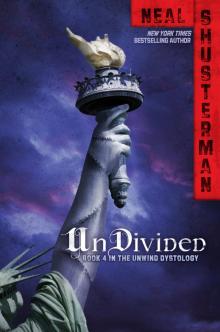 UnDivided
UnDivided UnBound
UnBound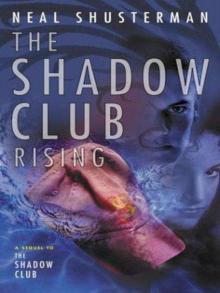 The Shadow Club Rising
The Shadow Club Rising Scorpion Shards
Scorpion Shards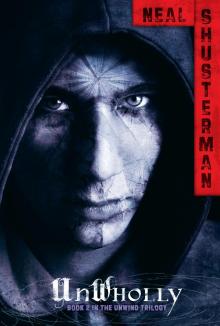 UnWholly
UnWholly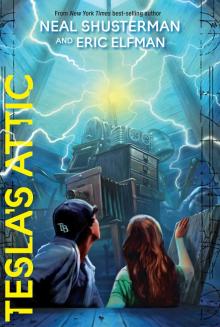 Tesla's Attic
Tesla's Attic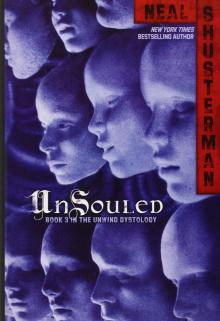 UnSouled
UnSouled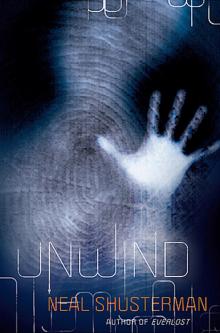 Unwind
Unwind Violent Ends
Violent Ends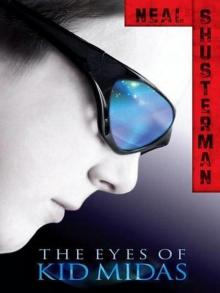 The Eyes of Kid Midas
The Eyes of Kid Midas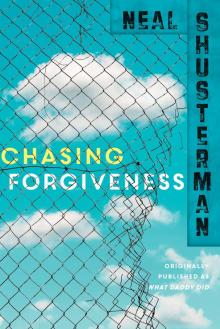 Chasing Forgiveness
Chasing Forgiveness Everfound
Everfound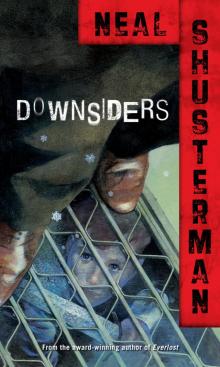 Downsiders
Downsiders The Schwa Was Here
The Schwa Was Here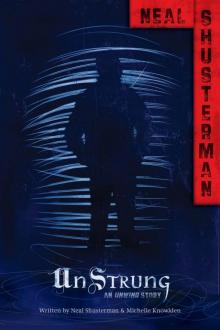 UnStrung
UnStrung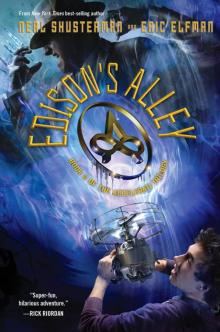 Edison's Alley
Edison's Alley Duckling Ugly
Duckling Ugly Everlost
Everlost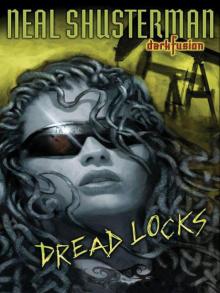 Dread Locks
Dread Locks Antsy Floats
Antsy Floats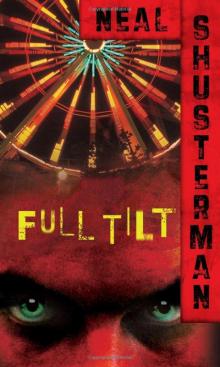 Full Tilt
Full Tilt Thunderhead
Thunderhead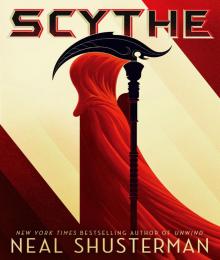 Scythe
Scythe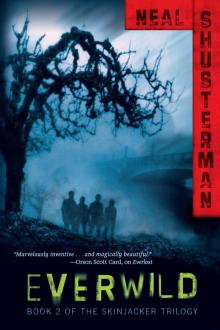 Everwild
Everwild Challenger Deep
Challenger Deep Shattered Sky
Shattered Sky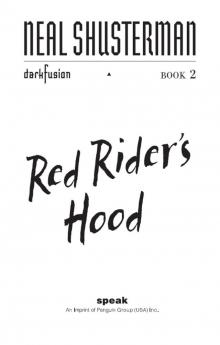 Red Rider's Hood
Red Rider's Hood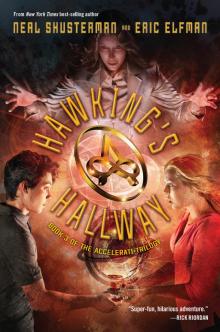 Hawking's Hallway
Hawking's Hallway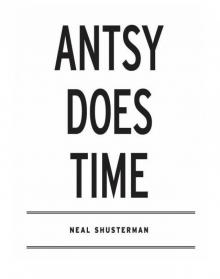 Antsy Does Time
Antsy Does Time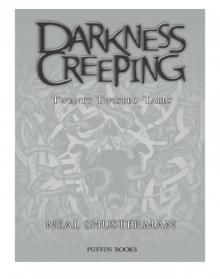 Darkness Creeping: Twenty Twisted Tales
Darkness Creeping: Twenty Twisted Tales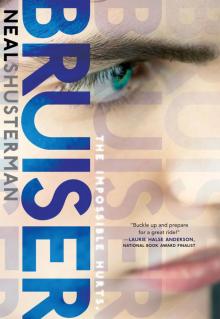 Bruiser
Bruiser Thief of Souls
Thief of Souls The Toll
The Toll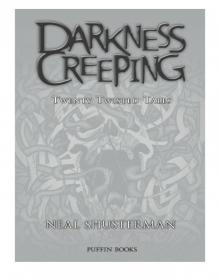 Darkness Creeping
Darkness Creeping Resurrection Bay
Resurrection Bay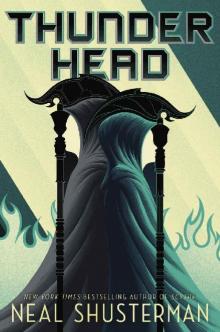 Thunderhead (Arc of a Scythe Book 2)
Thunderhead (Arc of a Scythe Book 2)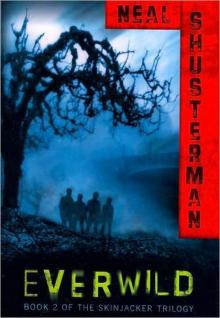 Everwild (The Skinjacker Trilogy)
Everwild (The Skinjacker Trilogy) Everfound s-3
Everfound s-3 Edison’s Alley
Edison’s Alley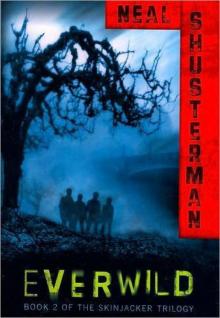 Everwild s-2
Everwild s-2 Dry
Dry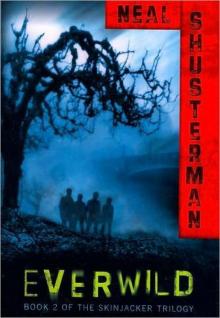 Skinjacker 02 Everwild
Skinjacker 02 Everwild Everlost s-1
Everlost s-1